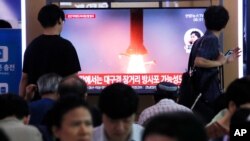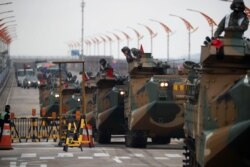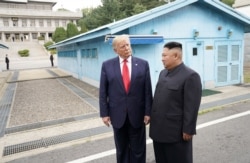Updated: July 30, 2019, 9:07 p.m.
SEOUL — North Korea fired two short-range ballistic missiles early Wednesday, according to South Korea's military, Pyongyang's second launch in less than a week amid stalled nuclear talks.
The missiles, launched from near the eastern port city of Wonsan, flew for about 250 kilometers and reached an altitude of 30 kilometers, South Korea's Joint Chiefs of Staff said.
The launch comes six days after North Korea's previous ballistic missile test, which it said was a response to South Korea's decision to purchase U.S. weapons and hold military drills with the United States.
It was not immediately clear if Wednesday's launches used the same type of short-range ballistic missile as last week's test. Pyongyang last week tested what appears to be its own version of a Russian-made Iskandar short-range ballistic missile. The North also tested that missile in May.
The launches are consistent with North Korea's recent pattern of escalating pressure on Washington and Seoul, even while being careful not to completely upset nuclear talks.
North Korea has said it could restart intercontinental ballistic missile and nuclear tests if Seoul and Washington go ahead with military exercises planned for later this year. Pyongyang has also said it may not resume working-level nuclear talks with the United States.
U.S. 'to monitor the situation'
U.S. President Donald Trump has not responded to the latest launch, but shrugged off North Korea's launches last week as short-range missiles that "lots test."
"I have a good relationship with him. I like him. He likes me. We'll see what happens," Trump said earlier Wednesday, referring to North Korean leader Kim Jong Un.
A U.S. official told VOA "we are aware of reports of a missile launch from North Korea ... and we will continue to monitor the situation."
North Korea is banned from any ballistic missile activity under United Nations Security Council resolutions. But U.S. and South Korea have downplayed the launches, in an apparent attempt to preserve talks with the North.
Many analysts have said that approach virtually ensures that North Korea will test more missiles, which will allow Pyongyang to further perfect its short-range missile technology.
"It is not appropriate to shrug off these tests as 'short range.' These missiles represent technological developments that threaten U.S. allies and forces in Asia," said Leif-Eric Easley, a professor at Ewha Womans University in Seoul.
Previous Trump-Kim meetings
Trump says he and Kim agreed to restart working-level talks during their meeting in late June at the demilitarized zone separating the two Koreas.
White House officials described the DMZ meeting as a possible breakthrough in the talks, which broke down in April after Trump and Kim failed to reach a deal at their second summit in Hanoi, Vietnam.
North Korea is seeking sanctions relief and security guarantees from the U.S. in exchange for partial steps to dismantle its nuclear program.
The Trump administration has been reluctant to ease sanctions until North Korea commits to abandon its entire nuclear weapons program. But more recently, U.S. officials have signaled more flexibility.
U.S. Secretary of State Mike Pompeo said Tuesday he hopes the two sides can find "creative solutions" for unlocking the talks.












